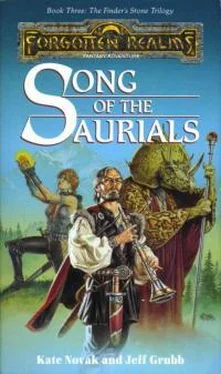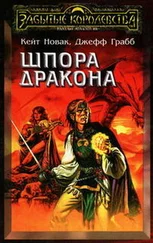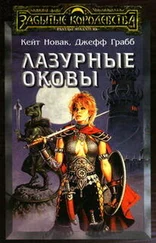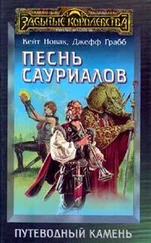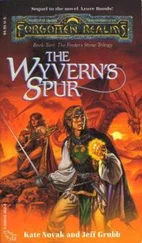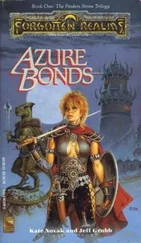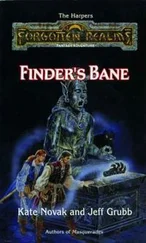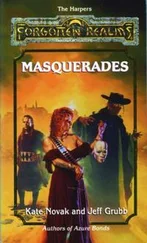Alias seemed at a loss to suggest any songs, so Olive chose one Finder hadn’t written, a lighthearted one. The song seemed to improve Alias’s mood. When they had finished, Olive suggested a tune of Finder’s, “The Hero of the Watch,” a seemingly innocuous song about a cat that saved a regiment of soldiers from an attacking horde of goblins. The swordswoman shivered slightly but nodded in agreement.
The voices of the two women blended nicely, but Olive felt as if she were the carrying Finder’s song alone. Alias was concentrating too hard on keeping control of the song instead of letting the music flow naturally. She kept her eyes fixed on the ground or Olive instead of directing them at her audience. She didn’t change the lyrics or tune or key, but without her spirit behind them, the songs were like ghosts.
Sensing that the song wasn’t going well, the swordswoman protested with a childlike cry, “I … I can’t do it,” and stopped singing in the middle of the last verse.
“Alias, just relax,” Olive said. “Don’t worry about changing the song. Finder said it was all right.”
Alias looked toward the bard. Finder nodded, but something in his look made Alias flinch as if the bard had struck her.
“That’s what he said,” Alias answered, “but Finder won’t love me if I change his songs.”
The bard rubbed at his temples, confused at how stubbornly Alias clung to her desire to please him. Flattery, on the other hand, had grown to hate him readily. “Alias, love is something people are supposed to give freely. It’s not a commodity to be earned or forfeited,” he said.
“Yes,” Alias said. “That’s what you taught me, but it’s not what you believe … is it?”
“Of course it’s what I believe,” Finder protested. “It’s what most of my songs are about.”
“You hold it up as an ideal,” Alias said, “but you don’t act that way yourself.”
Olive nodded, knowing Alias was right. Finder withheld his love when he was displeased and dispensed it lavishly only when Alias was behaving as he thought she should.
“Alias, I’m not perfect,” Finder said. “I became angry and said some stupid things. It doesn’t mean I won’t love you if you change my songs.”
“You say that, but it’s not true,” Alias insisted.
Finder sighed in frustration. “It is true. How can I prove it to you if you won’t sing?”
Alias’s eyes lit up suddenly. “Prove you believe it,” she said. “Take the risk yourself.”
“What?” Finder asked.
“You know I love you. Prove to me you’re sure I love you no matter what you do … or did,” Alias demanded.
“What are you talking about?” Finder asked. He looked frightened.
“Morala said there was something you didn’t tell the Harpers about the first singer you tried to create … something Maryje knew, something you were ashamed of,” Alias said. “Tell me what it was.”
Finder shuddered and shook his head. “I … I can’t,” he said.
“We need to hear Alias sing her soul song,” Akabar said. “It may make all the difference in whether or not we can defeat Moander. Does your pride mean more than that, bard?”
Olive shot Akabar an angry look. The mage’s life was so virtuous, he couldn’t understand the shame the bard felt. Olive patted Finder’s hand. “Tell her, Finder,” the halfling said. “She’s not going to love you any less for admitting your mistakes. I didn’t.”
Finder smiled sadly at the halfling, wondering if she was speaking as an agent for the goddess of luck or the god of justice. He looked back at Alias. Would his confession bind her closer to him or drive her away? Cast the dice, he thought, and pray for better luck than you deserve. “Very well,” he said.
In an impassive, distant tone, Finder began his tale. “I lied when I told the Harpers that I failed in my first attempt at making a singer like you. I created a man identical to me, with my thoughts and memories. My apprentice Kirkson named the man Flattery to tease me about my ego. The singer accepted the name and would take no other.”
Finder looked down at the floor for a moment, then raised his head back up and looked directly into Alias’s eyes as he made his confession. “I wasn’t the good parent to Flattery that Dragonbait was to you when you were created. When Flattery came to life, I demanded immediately that he sing for me, much the same way I ordered the finder’s stone to perform a task for me. Flattery attempted a tune. His voice was weak and immature. He was only a child, but I didn’t understand that. After my success with the finder’s stone, I expected instant success with Flattery. I grew frustrated when, after a mere three days of drilling, Flattery didn’t produce the quality of music it had taken me over a hundred years to achieve. In a rage, I struck him.”
“After that, Flattery wouldn’t attempt to sing again. He even refused to speak. I apologized, I begged, I shouted, I … beat him. Every day I went through the same cycle of contrition and violence, but he said nothing. Kirkson tried to convince me that what I was doing was wrong, but I wouldn’t listen. My other apprentice, Maryje, was too loyal to speak out in any sort of protest, but I could see she was terrified over what I was doing. That didn’t matter to me either. I refused to quit. On the thirteenth day of his life, Flattery escaped from his cage and stole a disintegration ring from my desk. He aimed it at me, but Kirkson threw himself in front of the ray and saved my life, forfeiting his own. Flattery slashed Maryje’s throat and fled from the workshop.
“I teleported Maryje to Shadowdale to be healed, then rushed back to the workshop to hide the evidence of Flattery’s existence. I knew what I had done to him was evil, but I was too ashamed to admit I’d done it. I concocted a story about the para-elemental ice exploding and asked Maryje to back up my lie. Maryje couldn’t lie, but she couldn’t betray me either. She simply stopped talking altogether. Her wound was healed, but she wouldn’t speak, or sing, ever again.
“Imagine my surprise when the Harpers condemned me for recklessly endangering my apprentices. A lifetime of exile and my songs wiped out forever. What, I’ve often wondered, would they have done if they’d learned the full extent of my crimes?”
“What happened to Flattery?” Alias asked.
“He’s dead. Olive can tell you more about that than I,” the bard replied. He stroked Alias’s hair with his hand. “So tell me, my daughter,” he asked, “can you still love me knowing how evil I’ve been?”
“Flattery, Kirkson, and Maryje are the people you have wronged,” Alias said. “Since they are dead, you can never make peace with them. You must try to make it with yourself. As for me, I’ll always love you.” She embraced the bard and kissed him on the cheek.
“And I you,” Finder replied. “Now will you sing?” he asked softly.
Alias nodded.
“Try ‘The Tears of Selûne’ again,” Akabar said. “It made you think of something that started you soul singing before.”
“You know,” the halfling said, “an old priestess of Selûne told me something interesting about that song. Selûne is the goddess of the moon,” Olive explained for Grypht’s benefit. “Anyway, this priestess said that the Shards—those are Selûne’s most powerful minions,” she explained for Grypht again. “The Shards sing the song for Selûne, but they sing it as a duet.”
“It should be sung as a solo,” Finder said automatically.
“I know,” Olive said, “but a modest halfling like me—”
Akabar guffawed at Olive’s description of herself.
“—like me,” Olive continued, “didn’t have the nerve to correct so venerable a priestess. Perhaps, Master Wyvernspur, the next time you run into the goddess Selûne, you should tell her to keep her minions under control. In the meantime, why don’t you try singing it with Alias, just this once?”
Читать дальше
